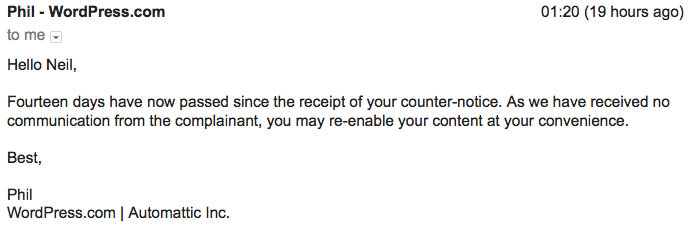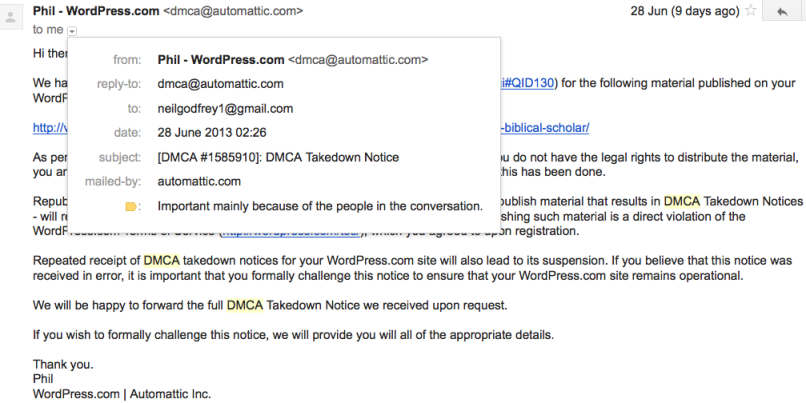R. Joseph Hoffmann on his blog The New Oxonian has been complaining about “the language and style” of “mythticists” — those he, Hoffmann, calls “disease carrying mosquitoes” and “buggers” — saying that they, the “mythticists”, lower the tone of the debate. In support of this assertion he has Tim O’Neill along calling mythicists’ arguments “conspiracist gibberish and pure bile”. I would love to ask Hoffmann to give examples of his own (and O’Neill’s) style of insulting language in any of Earl Doherty’s or Robert M. Price’s or Thomas Brodie’s books, but I don’t think he likes me very much and he is very selective about what comments of mine he allows to appear there.
For example, he begins his blog post by saying that this blog, Vridar, is some sort of rallying point for “a clutch of historical Jesus deniers” (deniers??) and that the reason for my role has something to do with my “conservative Christian background”. He was referring to my years in the Worldwide Church of God (WCG) though much of the 1970s and 80s. He and his fellow “Jesus Prospect” participants — he once posted a long list of these but to my knowledge only two others have ever posted anything on his blog: Maurice Casey and Stephanie Fisher. I don’t know any of them personally but all three have psychoanalysed me and concluded I have been left as some sort of twisted mental and emotional cripple from my years in the WCG.
I at first thought this to be a perverse and tendentious reading of everything I have ever published on my experiences with the WCG and how I left that cult and how I managed my life and readjustment after it. So when Hoffmann re-posted the same article I tried to briefly point out to him and his readers that he was being very one-sided in his view of me.
Hoffmann and Casey have attacked my character and person viciously in recent years. That’s a pity, because Hoffmann once complimented a post of mine in which I discussed an article about the “history of Jesus” over the past two millennia. And there was much I liked in his thesis on Marcion. So there was once hope we could hit it off. But I spoiled it by pointing out his inexcusably false accusation of Earl Doherty in one of his print publications on Goguel. I do hate it and am always enraged when I see public intellectuals abusing their status by telling outright porkies. (Some scholars have interpreted this as meaning I am somehow “against all scholars”. Do some really think they are all liars by profession?)
Hoffmann has from time to time continued to go out of his way to direct some insult this way, but I decided this time to try to correct the record when he recycled his year old post. I wrote:
LOL. Oh Hoffy, you are hard up for material, aren’t you. Firstly, I was brought up in a very liberal Methodist church and was most happily in an even more liberal Anglican one before I decided to abandon faith altogether. So what is my theological agenda now that I have posted and support the views of Thomas Brodie who is one of several Catholic scholars who have acknowledged that Christianity can indeed survive without an historical Jesus? Sorry to disappoint you if I am not an angry atheist hell bent on attacking Christianity as you seem to need me to be doing.
Stephanie Fisher (she’s a doctoral student of Casey’s so we must presume she really does have fundamental reading comprehension ability when she tries) jumped in with this:
From minimal research into various Christian cults I would describe the WCG (Worldwide Church of God) as a particularly terrifying fundamentalist Christian cult and one which would take great strength and support to get out of, even leaving one quite bereft and possibly emotionally injured. I would not include ‘happy’ and ‘liberal’ if describing a devotee.
Er, yes, the WCG was certainly not liberal but what did Steph’s comment have to do with what I said?
My pre-atheist and pre-Vridar background
So I wrote the following to try to explain a few facts. Hoffmann deleted the comment. He did not allow facts to get in the way of a good kick-Neil session. I asked him again to post it but he declined: Continue reading “What R. Joseph Hoffmann Does Not Want (Anyone) To Believe About Me”
Like this:
Like Loading...







